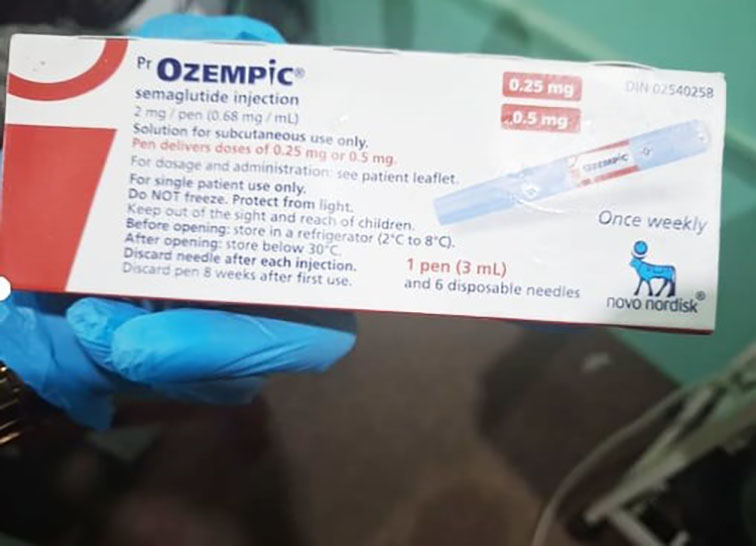-warns that the drug not registered for sale here
The authorities yesterday alerted the public to the possible presence here of fake versions of the diabetes and diet pill, Ozempic.
Coming on the heels of a May 22nd Stabroek News story about the marketing of the wildly popular diet pill here, the Government Analyst-Food and Drug Department (GA-FDD) also warned that Ozempic (semaglutide) is not registered here and therefore should not be marketed for sale locally.
The GA-FDD urged individuals to report any entity offering this product for sale by contacting them at the following numbers: (592) 222-8859, 222-8934, or via WhatsApp at (592) 222-8011.
It added that Guyana is among countries that could potentially be affected by the distribution of the fake versions of Ozempic. It cited World Health Organization information regarding three falsified batches of Ozempic. These counterfeit products were identified in Brazil (October 2023), the United Kingdom (October 2023), and the United States of America (December 2023), and were distributed through regulated supply chains.
The GA-FDD said that Guyana is among the countries that could be affected by the distribution of the fake batches. According to Novo Nordisk, the genuine manufacturer, batch number LP6F832 is not recognised, the combination of batch number NAR0074 with serial number 430834149057 does not correspond to genuine manufacturing records and batch number MP5E511 is authentic but the product is not.
It said that the use of the fake Ozempic poses serious health risks to consumers, including ineffective treatment due to incorrect dosage, contamination with harmful substances, or unknown and substituted ingredients. Given its subcutaneous administration, the health hazards could be life-threatening, it said.
Tandeka Barton, Director of the Food and Drug Department, confirmed to Stabroek News yesterday that the department is actively investigating the matter, relying on reports from consumers to aid in their efforts.
In recent discussions, concerns have emerged regarding the registration status and legalities surround the importation, sale and administering of drug Ozempic, a brand name prescription medication touted for its efficacy in managing diabetes and aiding weight loss. The absence of registration in Guyana renders its use, importation, sale and administering illegal, according to the Food and Drug Act of 1971 and its accompanying Regulations of 1977, potentially subjecting it to seizure and removal upon discovery in public spaces.
Dr. Leslie Ramsammy, Advisor to the Minister of Health recently told Stabroek News “Ozempic is not yet registered and those who are using it are maybe using the medication that is not authentic. There are other versions of Semaglutide that have been registered and are currently being used by a clinic in Georgetown, however, the version `Ozempic’ has not.”
Illegal importation
Investigations by Stabroek News have revealed that Ozempic is currently being imported and sourced in a manner that contradicts the law. As per the Food and Drug Act of 1971 and its accompanying Regulations of 1977, only certain entities—namely, a practitioner, a licensed drug manufacturer, a licensed drug importer under the direct control of a pharmacist, a pharmacist, or the Government Analyst—are permitted to import such drugs. Ozempic was at one time being imported by a well-known medical institution that has since discontinued this.
One requirement for the importation of pharmaceuticals through the Guyana Revenue Authority, is to have a pharmaceutical import licence. Based on information received from a source within the Guyana Revenue Authority, the organization’s jurisdiction extends only to ensuring the quantity, description and expiry date of the pharmaceuticals imported matches the amount on the pharmaceutical import licence presented. A report is only made by the GRA to the Ministry of Health if any of these three categories are in breach. Therefore, any drugs being imported through the Guyana Revenue Authority, would have to be facilitated by a “registered” and licensed source, as was in the case of an entrepreneur here who purchased hers from a licensed pharmaceutical distributor, and the well-known institution which has now discontinued the sale and administering of Ozempic.
Reliable sources in the medical field said that the drug is also being imported through unofficial channels, often referred to as the “suitcase trade”. Furthermore, the sale and administration of Ozempic without a prescription is also in violation of the law. The law stipulates that no individual shall sell a Third Schedule Drug unless they have received a prescription for it. Such a prescription must include specific details: (a) the recipient’s name and address, (b) the drug’s name and quantity, (c) provided usage instructions, (d) the prescription date, and (e) the practitioner’s signature. If the dispenser of the prescription is unfamiliar with the practitioner’s signature, it must be verified. Therefore, individuals operating in “bottom house” sales or within “medical spas” likely administer this purported “miracle weight loss drug” without a valid prescription, rendering the entire operation illegal. Consequently, due to its non-registration, actions such as importation, sale, and administration to clients inherently breach the law and are thus illegal.
Dr. Ramsammy underscored the pivotal role of regulatory bodies, healthcare providers, and patients in ensuring the lawful and safe usage of medications. He also urged patients to remain vigilant and acknowledge the potential adverse effects on their health.






